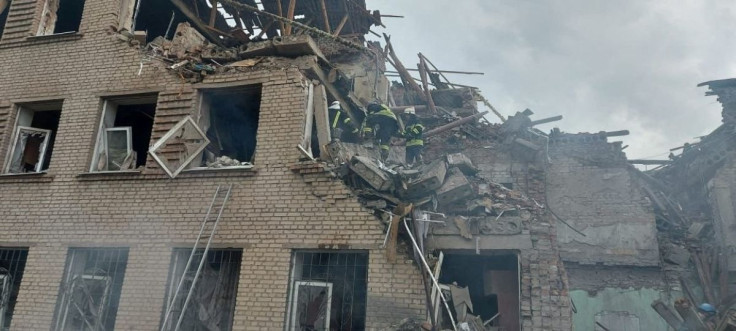Ukraine's Zelenskiy Says First Grain Ship 'Nothing', Economy In Coma

Ukrainian President Volodymr Zelenskiy dismissed the importance of the first grain export shipment from his country since Russia invaded, saying it was carrying a fraction of the crop Kyiv must sell to help salvage its shattered economy.
His downbeat comments, via video to students in Australia on Wednesday, came as an inspection of the ship was completed in Turkey before it passed through the Bosphorus Strait en route to Lebanon under a deal aimed at easing a global food crisis.
The ship, Razoni, left Odesa on the Black Sea early on Monday carrying 26,527 tonnes of corn to the Lebanese port of Tripoli. It followed a U.N.-brokered grain and fertiliser export agreement between Moscow and Kyiv last month - a rare diplomatic breakthrough in a drawn-out war of attrition.
But Zelenskiy, speaking via an interpreter, said more time was needed to see whether other grain shipments would follow.
"Just recently, thanks to the U.N. in partnership with Turkey, we had a first ship with the delivery of grain, but it's still nothing. But we hope it's a tendency that will continue," he told the students.
He said Ukraine, one of the world's top grain producers before the war, had to export a minimum 10 million tonnes of grain to urgently help bring down its budget deficit which was running at $5 billion a month.
U.S. Secretary of State Antony Blinken welcomed the grain shipment but also said it was "only a first step".
A senior Turkish official said three ships could leave Ukrainian ports daily after the Razoni's departure, while Ukraine's infrastructure minister said 17 more ships had been loaded with agricultural produce and were waiting to set sail.
Known as Europe's breadbasket, Ukraine hopes to export 20 million tonnes of grain held in silos and 40 million tonnes from the harvest now under way, initially from Odesa and nearby Pivdennyi and Chornomorsk.
"The war...is almost killing the economy. It's in a coma," Zelenskiy said. "Russia's blocking of the ports is a great loss for the economy."
Zelenskiy has repeatedly warned that Moscow may try to obstruct exports despite signing up to last month's deal.
PUTIN AND SCHROEDER
Russia, which blockaded the ports after launching its "special military operation" on Feb. 24, has said it wants to see more done to facilitate the exports of its own grain and fertilisers.
It has denied responsibility for the food crisis, saying sanctions by the West, which regards the war as an unprovoked imperial-style Russian land grab, have slowed its exports.
Russia also said that the United States was directly involved in the conflict in Ukraine because U.S. spies were approving and coordinating Ukrainian missile strikes on Russian forces.
U.S. President Joe Biden has said he wants Ukraine to defeat Russia and has supplied billions of dollars of arms to Kyiv but U.S. officials do not want a direct confrontation between U.S. and Russian soldiers.
Former German Chancellor Gerhard Schroeder, a friend of Russian President Vladimir Putin, said the grain deal might offer a way forward out of conflict.
"The good news is that the Kremlin wants a negotiated solution," Schroeder told Stern weekly and broadcasters RTL/ntv on Wednesday. He said he had met Putin in Moscow last week.
"A first success is the grain deal, perhaps that can be slowly expanded to a ceasefire."
Kremlin spokesman Dmitry Peskov said Putin had also told Schroeder that, in theory, the Nord Stream 2 gas pipeline was ready to be used to help increase gas supplies to Europe.
Germany and some other European countries are planning for a winter supply crunch after Moscow cut gas supplies via another pipeline, the Nord Stream 1, citing technical issues with gas turbines supplied by Siemens Energy.
© Copyright Thomson Reuters 2024. All rights reserved.











